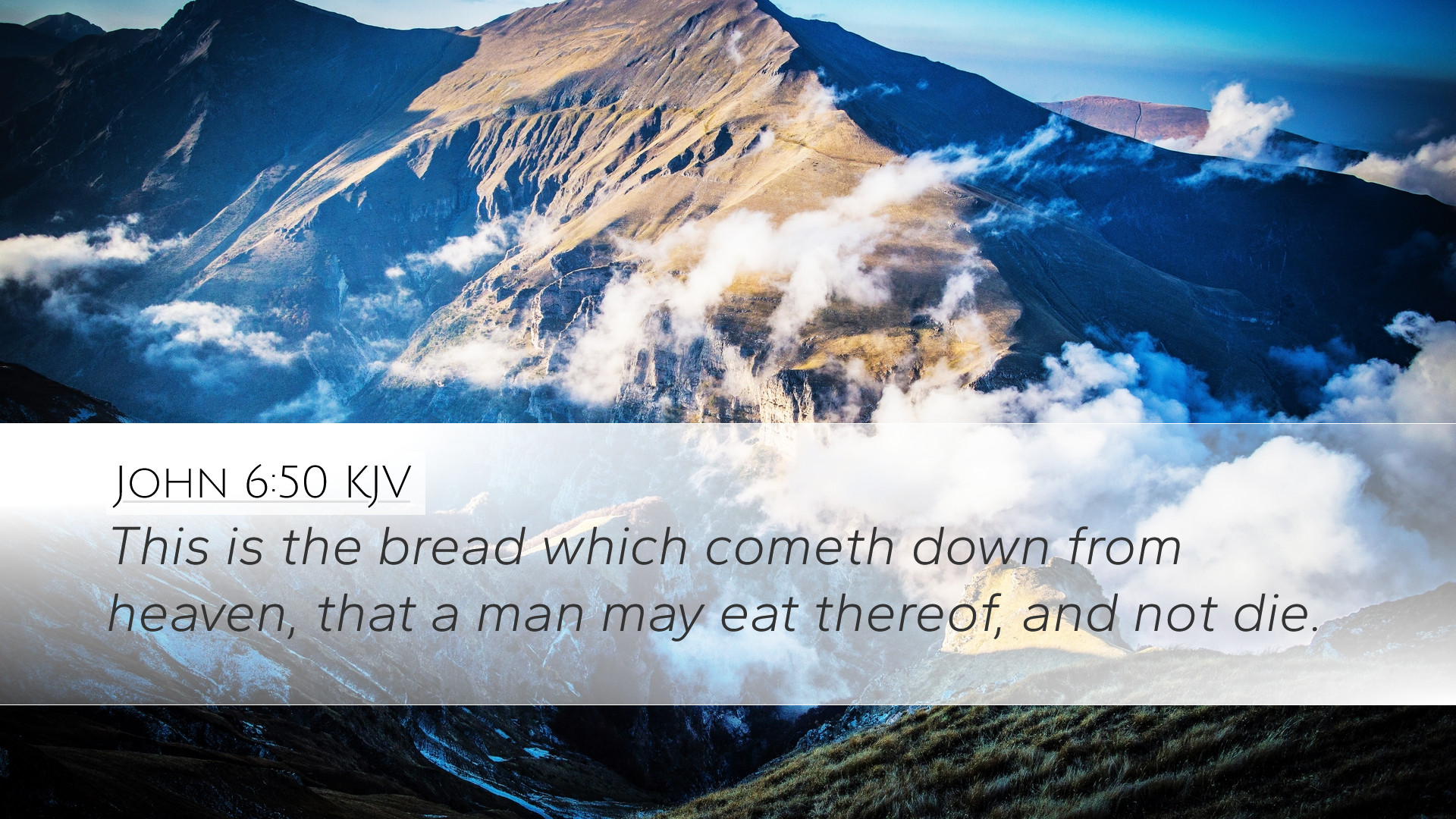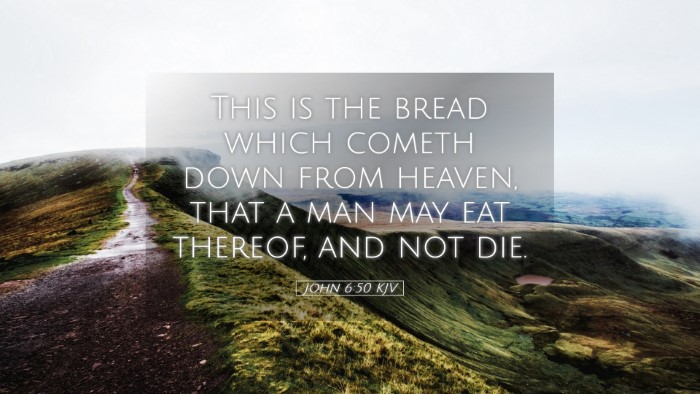Bible Commentary on John 6:50
John 6:50 states, "This is the bread which cometh down from heaven, that a man may eat thereof, and not die." This verse encapsulates the theological significance of Jesus as the Bread of Life, revealing the duality of physical and spiritual nourishment. The insights derived from various public domain commentaries provide a rich understanding of this passage.
Contextual Overview
To fully appreciate John 6:50, it is essential to consider it within the broader discourse of John 6. This chapter reveals Jesus’ teaching about the bread of life after He fed the 5,000, illustrating His divine provision. The setting emphasizes a transition from physical sustenance to spiritual truth.
Insights from Public Domain Commentaries
Matthew Henry's Commentary
Matthew Henry emphasizes that the bread referenced by Jesus contrasts with the bread that fills the stomach, focusing instead on the eternal sustenance that sustains the soul. He points out:
- Heavenly Origin: Henry suggests that this bread is "that which cometh down from heaven," highlighting its divine origin. He notes that it cannot be sourced from human efforts but comes directly from God, affirming the idea that Jesus is the ultimate provision for life.
- Eternal Life: He interprets the phrase "may eat thereof, and not die" as a promise of eternal life. The act of eating in this context symbolizes faith and acceptance of Christ, resulting in spiritual vitality that transcends physical death.
Albert Barnes' Notes on the Bible
Albert Barnes adds an exegetical depth to this verse, exploring the implications for believers:
- Manna Comparison: Barnes draws parallels between the bread of life and the manna provided to the Israelites in the wilderness. He explains that while manna was temporary and could only sustain them physically, the bread from heaven offers a lasting solution to humanity’s spiritual hunger.
- Spiritual Understanding: He emphasizes the necessity for believers to have spiritual discernment to understand Christ's intentions. Eating the bread signifies partaking in Christ Himself, which leads to eternal existence beyond mortal limitations.
Adam Clarke's Commentary
Adam Clarke provides a pastoral perspective, focusing on the implications for everyday faith:
- Faith as Consuming: Clarke notes that to "eat" the bread signifies an active faith that consumes and incorporates Christ into the believer’s life. This act is vital for spiritual nourishment and involves a close relationship with Jesus.
- Warning Against Spiritual Death: He warns that neglecting this bread leads to spiritual decay. Clarke insists that those who overlook the significance of Christ as their sustenance are at risk of eternal separation from God.
Theological Implications
Theologies drawn from John 6:50 engage with significant doctrines such as salvation, incorruptibility, and the nature of Christ. Each commentary provides insights for a deeper understanding:
- Soteriology: This passage serves as a foundational text for discussions on salvation. The metaphor of eating suggests an assimilative process, where believers actively receive and incorporate Christ into their lives.
- Eschatology: The promise of "not die" speaks to the eschatological hope of resurrection. Believers are assured of their continuous existence in communion with Christ, even beyond physical death.
- Christology: The identification of Jesus as the 'living bread' links His incarnation to divine sustenance. This reinforces the belief in Christ as central to both life and eschatological fulfillment.
Pastoral Applications
For pastors, the application of John 6:50 can guide sermon preparation and pastoral care:
- Encouragement for the Congregation: Highlighting Christ as the source of life encourages believers to seek Him actively in their daily lives, reinforcing their faith through scripture and community.
- Communion Reflection: During Communion services, this passage serves as a focal point, inviting congregants to participate in a profound understanding of Christ as their sustenance.
- Catechesis: Engaging with this text during teaching moments can deepen understanding of foundational Christian beliefs about Jesus' nature and the importance of spiritual nourishment.
Conclusion
John 6:50 encapsulates the profound mystery of Christ as the Bread of Life, inviting believers into a deep and transformative relationship with Him. The insights from Matthew Henry, Albert Barnes, and Adam Clarke enhance our grasp of the passage by providing layers of understanding that connect theological concepts with practical applications. As we delve into this verse, we are reminded of the essential nature of faith in Christ for eternal life and the sustaining power of His presence in our spiritual journeys.


